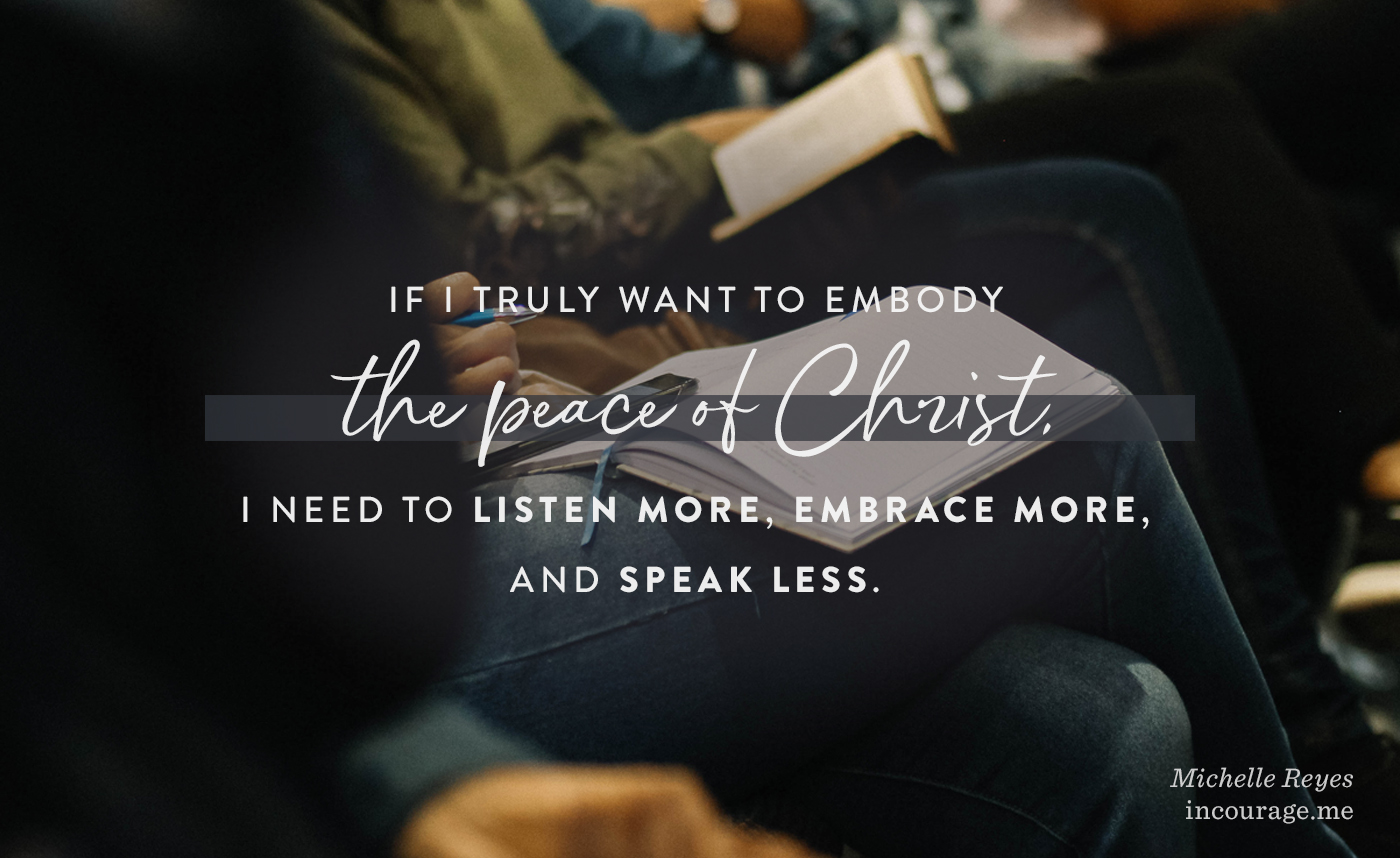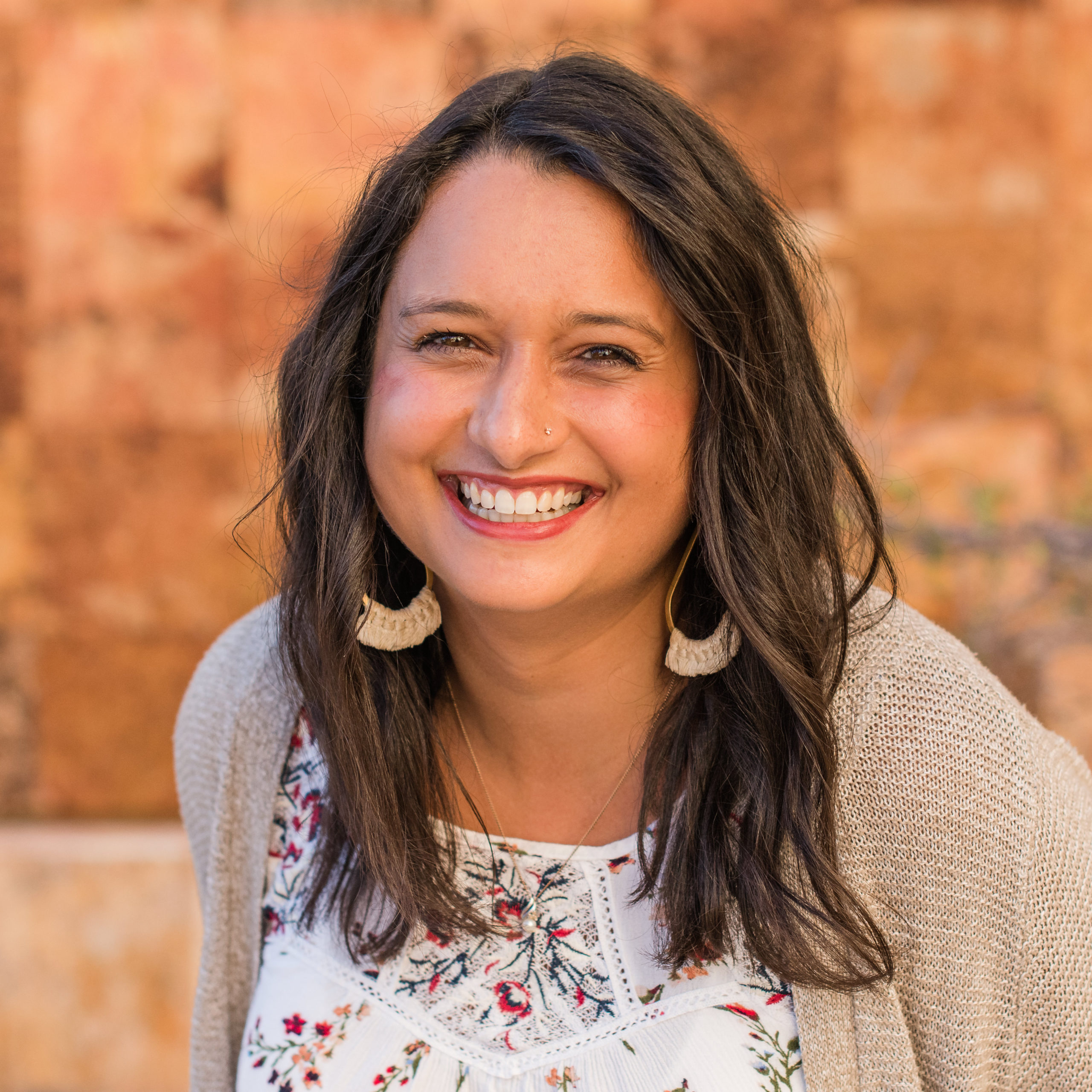I was sitting in a Bible study, biting my lip so hard I thought it would bleed. We were a group of fifteen women, discussing an incredibly controversial topic, and I could already feel the frustration rising in my chest. Not only did I disagree with the other women in the room, but my emotions were all over the place. I was starting to feel like a mess inside. You know that feeling you get when you start to grit your teeth, your eyebrows burrow, and you’re about to burst if you don’t say something?
My Enneagram 1 mind was racing with questions: Why do these women think this way? This idea is so wrong. Haven’t they ever read [insert three other Bible passages]? I was already crafting rebuttals in my head when I realized I needed to just stop. Perhaps I looked calm on the outside, but there was an out-of-control train raging on the inside, and it was time to take a deep breath and listen. I hadn’t even considered why these women thought the way they did or whether there was truth I could learn from them. And that was my problem, not theirs.
I’ve been learning lately about the power of silence. It’s only when we quiet ourselves that we can begin to hear others. Discussions in church, at a Bible study, or even on social media shouldn’t be about how much knowledge I have or if I can sound the smartest. Rather, my posture should be to make myself small in order to care about what the other person has to say, to understand where they’re coming from, and to engage them where they’re at. This is not about just letting my anger build up and then fuming about it later.
Learning to listen and even ask questions is about humanizing people. It’s about showing them their value as image bearers and treating them with respect instead of trying to crush their argument. I grew up in conservative Christian circles where I was trained to win arguments, and I see now the damage that this approach inflicts. Looking down on someone else’s ideas or thinking less of them for the way they’ve expressed themselves only perpetuates hurt and further divides.
Speaking of division, we as Christians are nothing if not divided, am I right? We live in a society of tightly constructed binaries, and everyone is either right or wrong, praised or condemned. We all have our categories. We’re either majority or minority, white or people of color (POC), Republican or Democrat, progressive or conservative, complementarian or egalitarian, woke or culturally ignorant. Our tendency is to marginalize and even demonize any voice other than our own. But you and I will never have robust theological minds and hearts if we can’t listen to each other and at the very least consider why the other person thinks the way they do.
In the gospels, we see Jesus continually challenge His disciples to stop fighting among themselves. In Mark 9, for example, the disciples are argue over who is the greatest, and Jesus inserts Himself into their petty quarrel in order to redirect the conversation. He sits them down and says, “Anyone who wants to be first must be the very last, and the servant of all” (Mark 9:35). In saying this, Jesus shows them how each of them is wrong. First, they’re wrong because they want to be great in the world’s eyes, and this is antithetical to the kingdom of God. And second, they’re wrong because they’re trying to one up their fellow brother. Jesus challenges them to remove terms like winning and “the greatest” from their vocabulary and to instead value humility by putting the other’s interests above their own.
This is Jesus’ response to disunity among believers: He meets us in the midst of uncomfortable situations and challenges us to find ways to create forbearance on tough issues we disagree on. The goal is not to win the debate or to even see a conversation as a debate in the first place. Rather, we need to sit in and dwell over different views. We need to cling to Christ by honoring what another person has shared. As a friend once told me, I don’t necessarily have to agree with someone else’s viewpoint, but I still need to find a way to delight in them as a person. I need to understand where they’re coming from, why they believe what they do, and show them that I love them simply because they are made in the image of God.
If I truly want to embody the peace of Christ, I need to listen more, embrace more, and speak less. When I feel anger rising or my body cringing in visceral response to theological statements I disagree with, I need to first stop and listen. I owe it to my fellow brothers and sisters in Christ to take a deep breath and hear what they have to say. Instead of asking myself who is right, I need to consider what the way of Christ is. It is quite possible that both myself and the person I’m in dialogue with are wrong. In fact, I know there is still so much I have to learn and grow in, and this is why humility and seeking peace, not victory, should always be the aim. In every uncomfortable conversation, I must find Christ, cling to Him, and continually consider better paths forward.
[bctt tweet=”You and I will never have robust theological minds and hearts if we can’t listen to each other and at the very least consider why the other person thinks the way they do. -Michelle Reyes (@dr_reyes2):” username=”incourage”]
Leave a Comment






Michelle,
With all the disunity in this world today we don’t need to add to it in the Christian sector. God wants us to encourage & love on each other. Like Jesus we should be willing to hear people out. Let them express their opinions & then give ours. It could be we can both learn something. None of us knows the whole story of each other. We could do well to listen & perhaps learn. By always trying to be right & have our say we may turn that person away from wanting to come back to church or Bible study. The Pharisees & Sadducees did just that. They were pious & pompous. Only thinking of themselves & their spot in church. God wants us to treat everyone equally. No one is any better or worse than the other. Let’s listen & care for others’ opinions.
Blessings 🙂
Thank you, Beth, for your wise words. I love how you said, “We should be willing to hear people out.” I couldn’t agree more. We are so quick to shut someone down without even understanding where they’re coming from, or why an issue is important to them. That’s why we have to begin as better listeners.
This topic cuts close to the bone for me, Michelle, because I recently sat through a situation in which I know I should have opened my mouth, but failed to. This is not the first time lazy cowardice and listening to the voice inside my head that tells me I have nothing of value to add to the conversation have left me speechless, but I also don’t want to make the mistake of throwing word-bombs into a gathering.
We are so dependent upon God for discernment. How amazing that the indwelling Spirit can overcome our natural tendencies in any direction and enable us to minister grace with our words.
Thanks for sharing your heart, Michele. And I totally get it. I’ve been there too, and it’s so hard. There are definitely situations where God will give us the boldness and the courage to proclaim truth and stand up for justice. That is important too. For someone like myself, who speaks up regularly, I’m learning when to just listen. No matter where we are in this journey, though, we can all seek to embody Christ, and challenge ourselves to delight in the other person, regardless of whether we agree with them or not.
We as Christ followers have to sometime see things from another Christ followers point of view. We might not agree with them. But there are people who are saved no matter what they think they are always right. It their way or no way. They like to get the lime light. They will do and say anything to get it. No matter even if we tell them we know what they are saying is wrong. They will always have answer for us. Try to put us down. You might as follower of God and there friend only telling them for there own good. As you know what they are saying or doing is wrong. But no they still no better. All you can do is say it once in a nice way. If they listen you won them over before they do and say something stupid. They will regret later. Then be cross with you their friend and say why did you let me do and say that. Why if you are meant to be my friend you would not have let me do or say that. But if they don’t listen to you when you have told them. All you can do is keep quite. I know it hard for you. I been there with a friend. She always knows best. It here way or no way. She is saved. I have in so many times wanted to say to her don’t do it or say it. Over things. As she always knows best. I did tell her once she never listened. She like the lime light. To feel she knows best. I got now I pray for people like that. Leave them in Gods hands. If in women group only speak when God by his Holy Spirit tell me when to speak and when not to speak. Keep quite so as I don’t do or say the wrong thing. Don’t get told of by anyone. Especially if someone who thinks they know better than me. Even if I am boiling in side I know they are looking for the lime light or saying something that they have no need to say. I do what Gods Holy Spirit tells me to do at that Women meeting our TLC as it is called. Say nothing then that person can’t be cross with me. I just stay sience like Jesus would want me too. Even though it hard. As the old saying says. Sometimes a shut mouth makes a wise head. Love Dawn Ferguson-Little
Hi Dawn, thanks for sharing your thoughts. I knew this post would be very personal because each of us can recall a conversation or situation where someone said something that made us uncomfortable, or where we just plain disagreed. And you’re right that moments like this have layers of complexity to them, and each different situation may require a slightly different approach. Perhaps, after the moment, we can lovingly pull our friend aside and share with her our concerns. Perhaps these are ongoing conversations that we have in love with our friends in private. The question I want to challenge all of us to, though, is also making room for disagreements. So often Christians are quick to tell others, “you’re wrong, and here’s why.” What would seeking shalom look like? How could we peaceably engage with someone who makes us uncomfortable? Maybe that means it’s even ok to be told off by someone.
Thanks for your words Michelle! A great reminder! I tend to be argumentative and want to be right, but that rarely solves the problem or provides any peace.
Amen. It sounds like you and I have a lot in common then 🙂 That’s exactly what I’m learning too. Proving that I am right and winning an argument can often be quite damaging. How do we find a different approach that seeks peace among our fellow image bearers, and only speaks truth with love, humility and gentleness?
Thank you! I can get so caught up in being right! But where does that even fit with Christ’s example of love and humility? I needed this today.
Thank you for every bit of this today
yes …sat through a women’s group where christian woman all agreed one thing was ok. I asked what about( this scripture) at which they just didn’t care..so even if someone is misguided it may not be the time to say a thing. the thing I was opposing was outrageous against the christian faith but this group wasn’t ready to learn that , they were stumbling in sin and not eager to leave the comfort of that place..changing our views isn’t comfortable.
I’ve learned to walk away..and pray for those who can’t see their path.
Michelle – boy you nailed it with this post! My prayers have grown in this last year to include, “Lord, help me speak half, listen double. Let me listen with a heart that is learning and not forming rebuttals or a better argument. Let there be spaces and pauses in my head, prayers, words and conversation.”
I am the person who will go where angels fear to tread – and I need to step back and ask – if God blessed angels won’t go, then who am I to think I should push through!
I have never been comfortable with silence and I have that dang gift of gab… so learning to sit in the silence is not an easy task, but worth it.
Thank you for your thoughts and wisdom –
In His grip of grace, none other,
Bonnie
Thank you so much Michelle, that pierced me straight to my heart .This is who I want to be.Rich in Grace and Mercy! Surrounded in Gods love! And to never forget ,apart from Christ, I am the unlovely and that everyone has worth and value.I am learning to just listen and learning to honor one another.